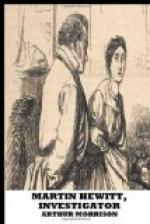“Yes, but I don’t at all understand this business of the drawings even now. How in the world were they taken out of the place, and how in the world did you find it out?”
“Nothing could be simpler; and yet the plan was rather ingenious. I’ll tell you exactly how the thing revealed itself to me. From your original description of the case many people would consider that an impossibility had been performed. Nobody had gone out and nobody had come in, and yet the drawings had been taken away. But an impossibility is an impossibility, after all, and as drawings don’t run away of themselves, plainly somebody had taken them, unaccountable as it might seem. Now, as they were in your inner office, the only people who could have got at them besides yourself were your assistants, so that it was pretty clear that one of them, at least, had something to do with the business. You told me that Worsfold was an excellent and intelligent draughtsman. Well, if such a man as that meditated treachery, he would probably be able to carry away the design in his head—at any rate, a little at a time—and would be under no necessity to run the risk of stealing a set of the drawings. But Ritter, you remarked, was an inferior sort of man. ’Not particularly smart,’ I think, were your words—only a mechanical sort of tracer. He would be unlikely to be able to carry in his head the complicated details of such designs as yours, and, being in a subordinate position, and continually overlooked, he would find it impossible to make copies of the plans in the office. So that, to begin with, I thought I saw the most probable path to start on.
“When I looked round the rooms, I pushed open the glass door of the barrier and left the door to the inner office ajar, in order to be able to see any thing that might happen in any part of the place, without actually expecting any definite development. While we were talking, as it happened, our friend Mirsky (or Hunter—as you please) came into the outer office, and my attention was instantly called to him by the first thing he did. Did you notice anything peculiar yourself?”




